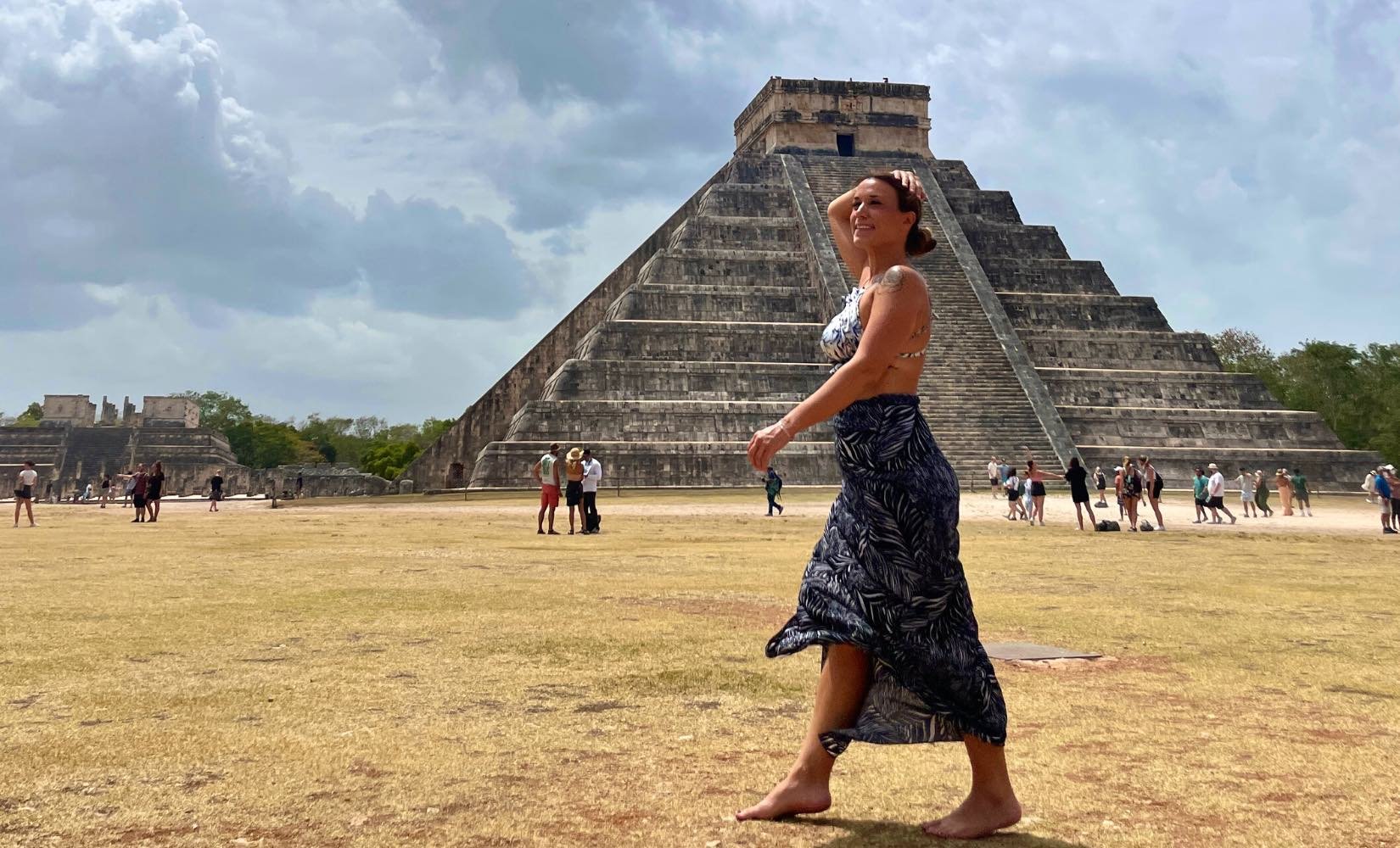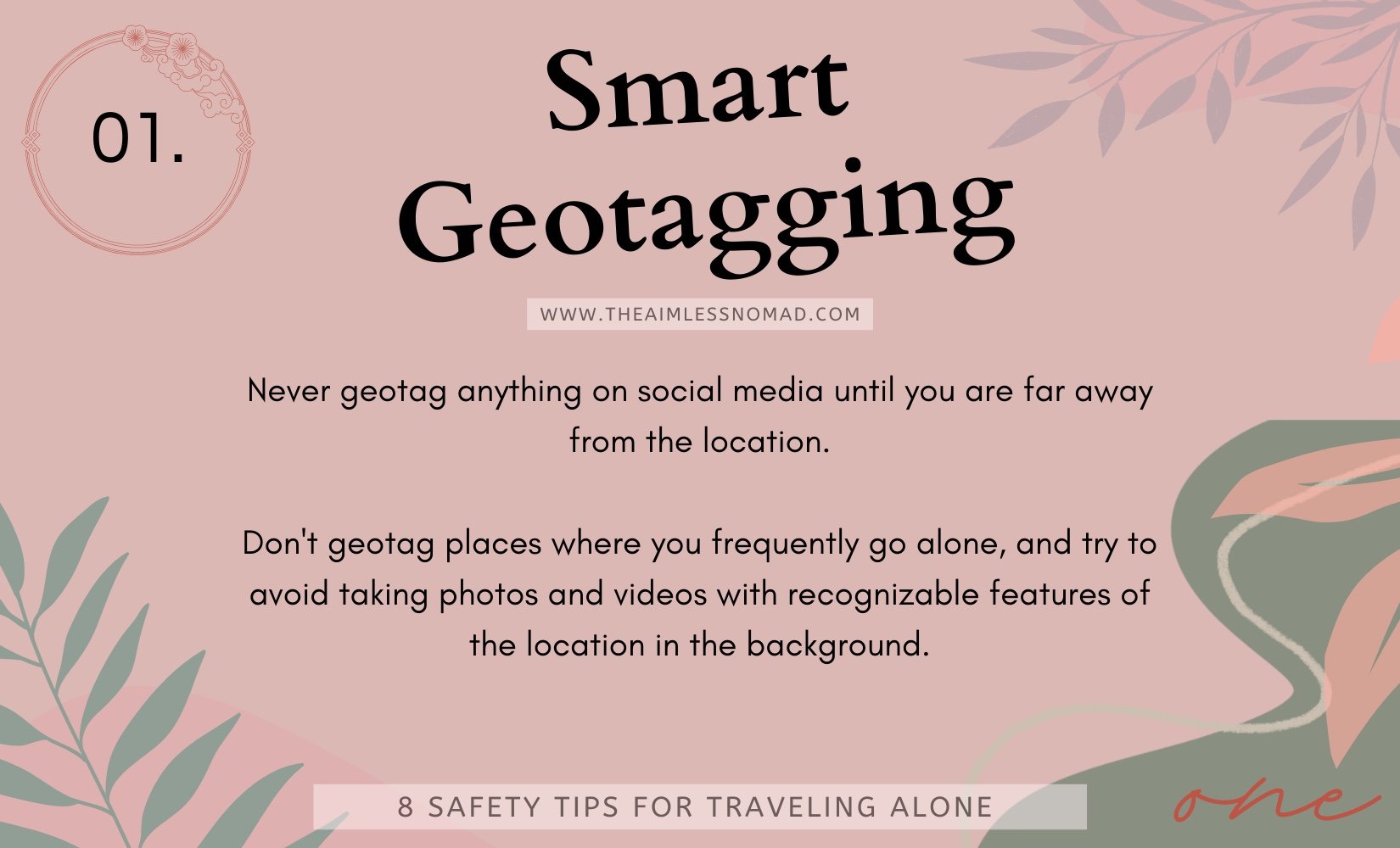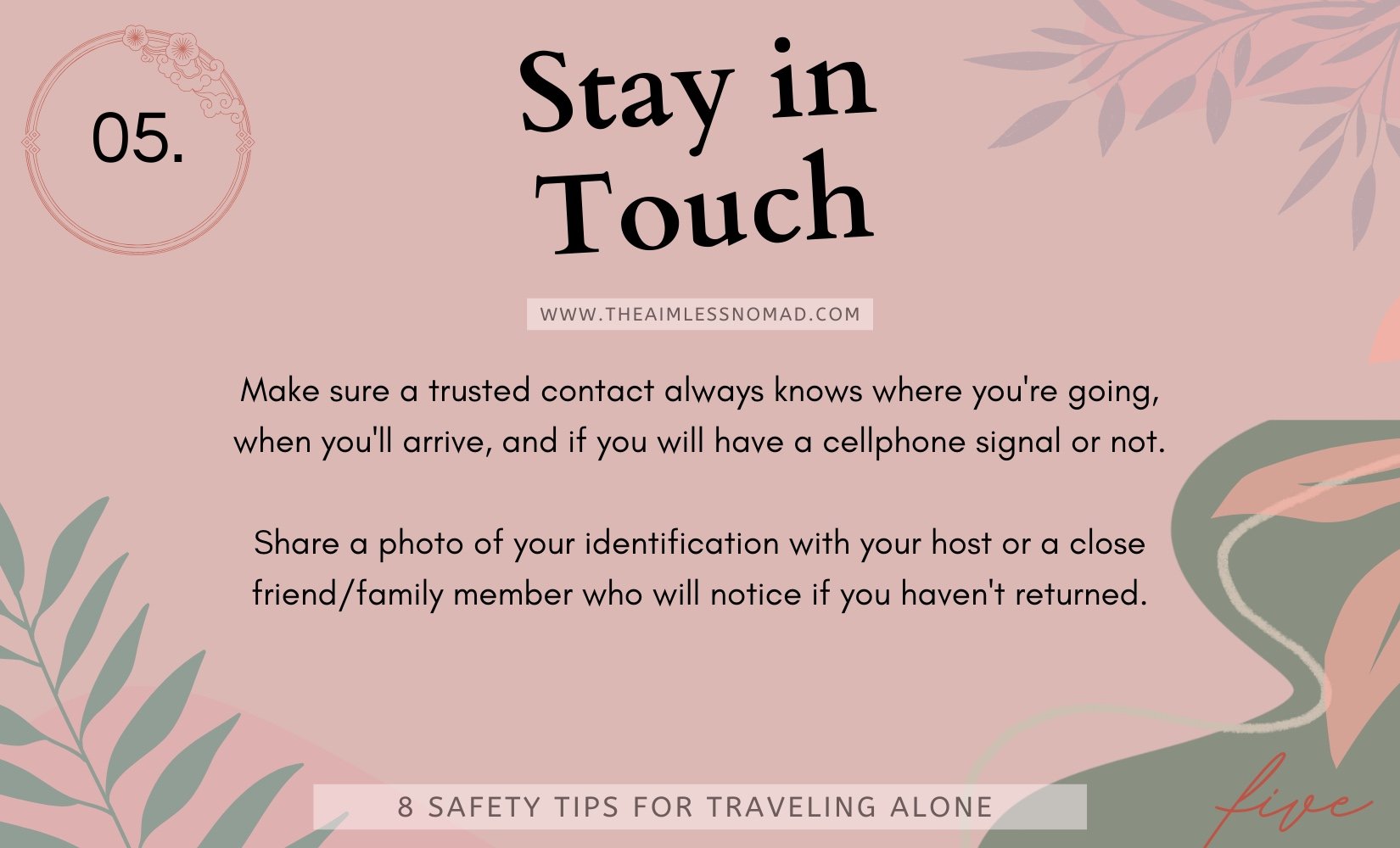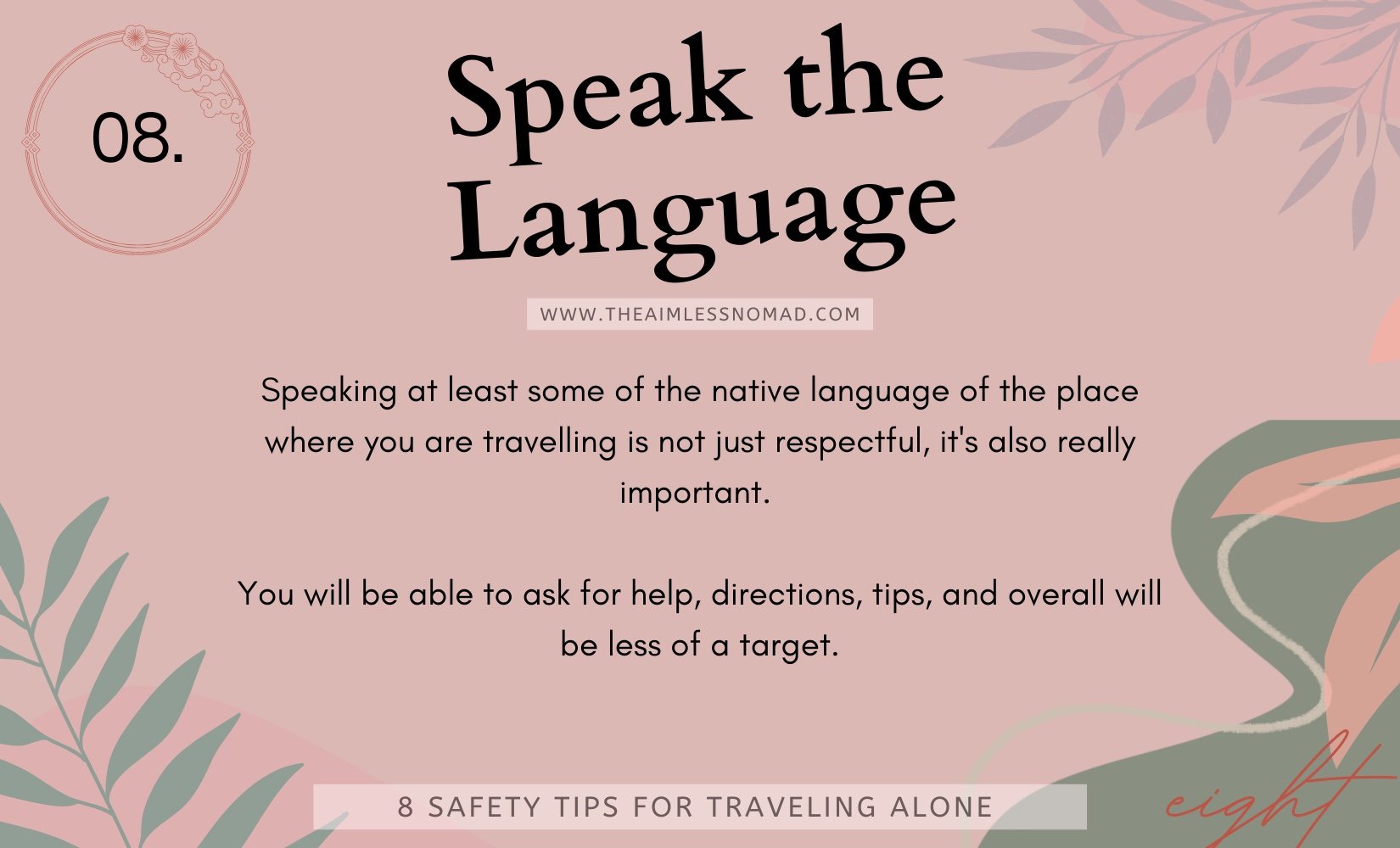8 Safety Tips for Traveling Alone: Part One
There are countless benefits to solo travel and everyone should try it at least once. One drawback, however, is the risk associated with travelling alone. Remember the expression “There’s safety in numbers.”? While it’s impossible to eliminate the risk altogether, there are steps you can take to minimize the chances of becoming a victim while traveling alone. Check out these safety tips I live by when traveling solo to keep myself feeling safe, no matter where I am in the world.
>> Watch this reel to explore one of the safest and most-charming cities in Yucatan, Mexico <<
1. Smart geotagging on social media
Geotagging on social media is attaching a location to a piece of media (photo, video, reel). For example, when you post a video to your Instagram story and specify where you are. The benefits of geotagging are reaching a wider audience and letting people know where you are. However, this can be problematic when you are alone.
Avoid geotagging anything on social media until you are far from the location or at home. Try to not geotag places you frequently go alone and avoid taking photos/videos in these places with visible identifiable features of the location. If going to a particular coffee shop every day alone is in your routine, you might not want the world to know because it makes it a lot easier for someone to target you when you’re alone.
2. Getting around and exploring alone
Exploring is the best thing to do when traveling alone, and you can do it on your own schedule! Aim to explore in the daytime and walk with confidence. Even if you’re lost, try to not look it. If you need to check a map or directions, head to a less-crowded area where you can have your back against a wall. This will give you privacy and make it more difficult to grab your cellphone in a snatch-and-run. When I need directions in a new place, I use a wireless earbud and cover it with my hair so I can listen to directions without looking lost.
When traveling alone at night, private transportation is always best. A lot can happen in a few seconds, so I opt to take a rideshare like DiDi even if I’m only traveling a few blocks away. Be sure to review tips #3 and #4 regarding safely using taxis and rideshares.
3. Using rideshares (Uber, Lyft, DiDi, etc.)
When using private transportation, rideshares are usually best. Some popular rideshare apps include Uber, Lyft, and DiDi. I prefer rideshares instead of taxis in Mexico because the companies screen their drivers and have safety features (e.g., forwarding trip information to a trusted contact and audio recordings during the ride).
Be sure to enable verification codes if you’re using an app like Uber to ensure you don’t get in the wrong vehicle by accident. A close friend recently got in a taxi by mistake after the driver convinced her that he was her Uber driver. Luckily, she was okay and he had no intention of kidnapping her (which does occur), but she did have to pay him a lot of money in the end.
4. Taking taxis safely
I don’t recommend taking taxis because of several bad experiences. Depending on where you are traveling, they can be expensive and dangerous. However, in some countries rideshare apps are not readily available. If taxis are your only option for private transportation, be sure to use them with caution. Ask someone to accompany you to the taxi so they can take photos of the license plate and taxi number. If the driver gets angry or defensive, don’t get in that taxi and wait for another one. Let the person know what time you expect to arrive home so, if they don’t hear from you, they can report the taxi to the company to be located.
Travelling or living in Mexico? Don’t make the mistake of leaving yourself unprotected! Whether you need tourist auto, resident auto, travel, health, boat liability, or homeowner/condo insurance - I can help you find the perfect, most affordable policy that is right for you.
5. Stay in touch with friends and family
You should always ensure someone knows where you are. I am guilty of often forgetting to share my accommodation details. But I try to send the information detailing where I’ll be staying AND provide a copy of my identification to my host/landlord in case of an emergency.
Try to always let a friend know where you’re going, with whom, and if you’ll have cellphone service. Extortion scams are common in Mexico and some other countries. For example, someone who knows you’re going to an area with no cellphone service will call your family and claim something bad has happened to you in an attempt to extort them into sending money. Since your family won’t be able to reach you, they may assume something bad has actually happened and send the money. This is avoidable by always letting someone know where you’ll be and by establishing a keyword/phrase with family and friends to indicate whether phone calls like this are legitimate or not.
6. Know the company you keep
Many of my friends laugh at this tip and say I’m paranoid. But truthfully, if I had started doing this earlier, I could have avoided putting myself in harm’s way on two separate occasions. Luckily, I am okay but this might not have been the case. If you want to date when traveling, by all means, enjoy yourself! Traveling solo can be lonely and sometimes you want to meet new people or have a bit of romance in your life.
If going on a date with someone, ask if it’s okay to take a photo of their identification to send to a friend. If they really want to go out with you with no bad intentions, it shouldn’t be a problem. If they’re picking you up, send a photo of their license plate to someone. This doesn’t mean you don’t trust them or think they’re a bad person. Motor vehicle accidents happen. It’s important that a family member or friend knows who you were last with (and in what vehicle) in case they don’t hear from you and need to contact the authorities.
7. Don’t rely on your cellphone as your lifeline
I can not emphasize this enough. Cellphones break, get lost/stolen, and batteries die. In many places in the world, cellphone signals are unreliable and your GPS and cellular data could stop working at any time. People often become stranded without their phone because they don’t know where their accommodations are, their GPS and data stopped working in the middle of nowhere, payment options are on their phone, they don’t know where they are, and they don’t know emergency contact numbers off by heart. Don’t be this person!
Memorize your route or buy a small map. Be sure to write down emergency contacts (this also helps if you are in an accident so someone can contact your family/friends). Consider buying a cheap backup cellphone to bring to areas where cellphones are more likely to be stolen. This way, you can leave your expensive phone at your accommodation for safekeeping.
8. Speak the local language
With the prevalence of English-speakers in tourist destinations and the popularity of translator apps, many people are skipping learning the language of the place where they’re travelling. As someone who resisted learning Spanish for a whole year in Mexico, I get it. However, learning at least some of another language is not just respectful, it can be really helpful.
You never know when you’ll need to ask for help, directions, and advice when traveling. Being able to speak the local language will make you less of a target and help you to fit in. Not being able to speak any of the local language not only makes you a bit of a headache to interact with, it also signifies you don’t have experience in that culture and makes it easier for people to mislead and take advantage of you.
I hope at least one of these 8 safety tips for traveling alone helps you feel safe on your nomadic adventure! Do you already follow some of these tips? Are there any tips in this list you never thought of before? Head to my Instagram to let me know and email me if you have any questions!
Stay tuned for more safety tips in Part 2 of this solo traveler safety tips series!
If you love traveling alone as much as I do, you know the benefits of solo travel far outweigh any risks. However, this doesn’t mean you can’t be proactive in protecting yourself and reducing your chances of becoming a victim!
Pin this to your travel board and refer back to it whenever you feel nervous about your safety while traveling alone. Feel free to pin or print each infographic from this article if you want to keep these tips accessible while traveling!
Disclosure: I only recommend products I would use myself and all opinions expressed here are my own. This post may contain affiliate links that, at no additional cost to you, I may earn a small commission.










